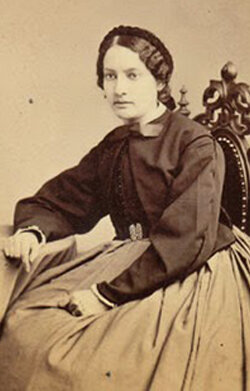100 Years Ago Women Won the Right to Vote and the Unsung Women Who Made It Possible
Written by Jaeda Lamar, WIN Staff
One hundred years ago, in August 1920, the 19th Amendment was passed in the United States. Experts would argue that the 19th amendment "does not give women the right to vote," it rather prohibits "any discrimination based on sex." The historic Seneca Falls Convention of 1848 was a small spark to what would soon be a blazing fire. And just like any other movement in civil rights history, it took years of hard work and push back.
Often the battle for women's voting rights in the U.S. is minimized to a singular movement and a few limited players when in actuality there were many factions and faces to the fight. The names that are most frequently referenced in regards to suffragettes are a result of a whitewashed history throughout the years. Names such as Susan B. Anthony, Elizabeth Cady Stanton, and Lucy Stone are the most commonly known, but there were many other pivotal women of color whose contributions were kept in the shadows.
After the Civil War (1861-1865), race issues caused the interracial group of suffragettes to split into smaller clusters. From the earliest times of suffrage in the U.S., Black women were allies even when it meant they might be further disenfranchised. African American women were purposely distanced from this movement to gain support from southern white women. Though being pushed away, Black women came through as the silent heroes. These silent heroes went on to start their organizations to secure and protect the rights of all men and women. Women such as; Harriet Forten Purvis, Maria W. Stewart, and Harriet Tubman were prominent voices pre-suffrage and are a few of the hidden figures we would like to remember today.
The Hidden Figures
Harriet Forten Purvis
When being a Black woman meant almost entirely a lack of rights, Harriet Forten Purvis risked her life for civil rights movements. Being an outspoken abolitionist and suffragist was extremely dangerous, but Harriet was not one to care. She established the Philadelphia Female Anti-Slavery Society with her mom, sisters, and Lucretia Mott, among others, in 1833. She was a member of the American Equal Rights Association and afterward, the National Woman Suffrage Association. Harriet managed to become a key organizer of the Fifth National Woman’s Rights Convention in Philadelphia in 1854. Through all of this, Purvis even facilitated abolitionist occasions at her home, and along with her significant other, Robert Purvis ran an Underground Railroad station.
Maria W. Stewart
Maria Stewart was also an abolitionist and women's rights activist. Stewart is known for four incredible discourses she conveyed in Boston in the mid-1830s, when no woman, regardless of race, set out to speak to a group of people from an open stage. Stewart's talks protested against social conditions being experienced by African Americans and women. Despite the fact that she had little formal education, Stewart continued to show her intelligence in her lectures, often referencing the U.S. Constitution and various literary works. When her actions were questioned, she would say that it's her "God-given right" to do so. Being that Stewart was a religious woman, much of the inspiration for her speeches came from the first Black female preachers like; Jarena Lee, Julia Foote, and Amanda Berry Smith. Maria Stewart was a pioneer for women around the world, as the first African American woman to lecture about women's rights, and black women's rights, the first American woman to speak to a mixed race audience of men and women, the first known American woman to lecture in public on political issues, and the first African American woman to make public anti-slavery speeches.
Harriet Tubman
Perhaps the most well known and referred to as the "Moses of her People," Harriet Tubman was an escaped slave that helped other enslaved people gain their freedom as the "conductor" of the Underground railroad. Harriet Tubman was a multifaceted woman that fought in the Civil War and, after her years served, devoted herself to the fight for women's rights. Tubman had confidence in the equality of everyone, Black or white, male or female. After the war, Tubman raised assets to help freed men and joined Elizabeth Cady Stanton and Susan B. Anthony. They continued looking for ladies' testimonials, thought about her maturing guardians, and worked with white author Sarah Bradford on her collection of memoirs as a possible wellspring of pay. As a woman who battled for her freedom and the freedom of others, Tubman set to work with her companions by visiting and giving addresses about her encounters as a female slave and as the emancipator of hundreds brought into the world under the subjugation of servitude.
100 Years Later...
A whole century later and the fight for equality still rages on. Many women who have come before us dedicated their lives to gain simple rights that most of us take for granted. Regardless of how far we have to go, our ancestors would be amazed at their progress. Remember and acknowledge how they were able to speak up and let that be a guide for you to use your voice. There is still much work to be done.




